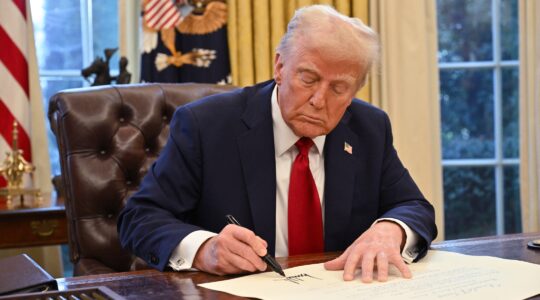LOS ANGELES (JTA) – “Hey, Rob, how are you!” John McCain said on the other end of the phone. He sounded like he’d been hovering over his cell phone, just waiting for me to dial his number.
I spoke to the senator, now the presumptive Republican candidate for president, March 26, while he was in Los Angeles for a full schedule of speeches and fundraisers. One of his local supporters arranged the interview, the only one he’s given to the Jewish press since clinching the nomination early last month, and the McCain campaign agreed to talk because they understand something uncommon is happening in this election: The Jewish vote is in play.
A higher percentage of Jews than usual are expected to take a second look at the Republican candidate for president this year. It doesn’t happen often, but it’s not unprecedented. In 1980, when Ronald Reagan ran for president, he got 38 percent of the Jewish vote. Once again, Republicans believe, this could be their year.
To paraphrase Mark Twain, Jews are like most Democrats, only more so.
“A sizable proportion of Democrats would vote for John McCain next November if he is matched against the candidate they do not support for the Democratic nomination,” according to a recent Gallup poll of all Democrats. “This is particularly true for Hillary Clinton supporters, more than a quarter of whom currently say they would vote for McCain if Barack Obama is the Democratic nominee.”
On issues of foreign policy, the Middle East and Israel, Jews will be weighing the candidates carefully.
So as pollster Peter Hart told Maureen Dowd last week, the question voters will ask about Sen. Hilary Clinton, is, “Is she honest?” Of Obama they will ask, “Is he safe?”
As for Jews, I suspect the McCain question will be just as simple: “Is he Bush?”
Early Wednesday morning, I drove downtown to the Bonaventure Hotel to hear McCain deliver his first major foreign policy address as the Republican nominee.
The event was a World Affairs Council breakfast for about 1,000 people, and the subtext of his speech was clear: “I’m not Bush.”
McCain began with a description of himself as a 5-year-old watching a Navy officer drive up to his home and tell his father, a Naval commander, that the Japanese had bombed Pearl Harbor.
“I rarely saw him again for four years,” McCain said.
“My grandfather, who commanded the fast carrier task force under Admiral Halsey, came home from the war exhausted from the burdens he had borne, and died the next day,” McCain went on. “I detest war…. It is wretched beyond all description…. Only a fool or a fraud sentimentalizes the merciless reality of war.”
Into my mind popped memories of President George W. Bush landing on a flight carrier in his jumpsuit, as well as his recent remarks that he’s “envious” of soldiers engaged in “romantic” combat – which was just what McCain intended.
As pointedly, McCain made the thrust of his speech the importance of America working together with other nations in creating a safe and secure world. He quoted John F. Kennedy and Harry S. Truman.
“But we must also lead by attracting others to our cause, by demonstrating once again the virtues of freedom and democracy,” he added.
He said he would immediately close down the prisons at Guantanamo. “We can’t torture or treat inhumanely suspected terrorists we have captured.”
He called for a new treaty to deal with global warming, a “League of Democracies” to lead the world, a nuclear nonproliferation regime.
All these policies together, McCain said, “will strengthen us to confront the transcendent challenge of our time: The threat of radical Islamic terrorism.”
In turning to the Middle East, he didn’t turn to Israel – and he didn’t mention the Israeli-Palestinian conflict: “The oppression of the autocrats blended with the radical Islamists’ dogmatic theology to produce a perfect storm of intolerance and hatred,” he said, not letting America off the hook for our support of these petro-dictators.
In an election season with a very unpopular war as its backdrop, McCain’s serious ideas about Iraq are bound to be demeaned and caricatured, as they already have been, everywhere from YouTube to The Huffington Post. (In fact, McCain has gotten a fairer and more insightful hearing on Jon Stewart’s “The Daily Show,” where he has made 11 appearances, than he has on HuffPost.)
You can think he’s wrong when he says the surge of American troops into Iraq is working, but his plan is more detailed – and draws on more experience – than the plans put forth for withdrawal by either of his opponents.
In the World Affairs Council speech, McCain gave a bit more nuance to his statements that America could be in Iraq “another 50 years, 100 years.” When Americans say the cost of Iraq is too high, he said, they mean the cost in lives. To withdraw and leave behind an unstable country would be to destabilize the entire Middle East, to strengthen the forces of Al-Qaeda and Iran. The United States continues to have a military presence, he pointed out, in countries that are now our allies, where past wars are long over: Japan, South Korea and Germany, all places where not a single soldier is at risk. That’s what he meant by staying there.
One could argue that the actual dollar cost is just a bit upsetting to Americans, as well, but McCain pointed out that no one stands outside his speeches protesting the cost of our bases in South Korea (“And they’re protesting everything else,” he said).
Nevertheless, his much-maligned statement came off as neither Strangelovian or Cheney-esque (i.e.; “So?”), but as an informed assertion of America’s power and responsibility, and a pointed rejection of Bush’s foreign policy of the past seven years. Sitting in the Bonaventure ballroom, I realized that the Republicans, finally, after seven years, have the chance to replace a teenager with a grownup.
So when I called the senator later that day for the pre-arranged interview – Hey, Rob, how are you? – I had my questions on Israel, Iraq, etc. all teed up, with my overarching one – are you Bush? – saved for last.
I started with Israel, asking the senator to compare his policies toward Israel to those of Clinton and Obama. I told him my sense is that over the years a bipartisan consensus has developed on the major Israeli-Palestinian issues, no matter who occupies the Oval Office. McCain deflected.
“Well I don’t know what their support is, so it’s hard for me to compare it,” he said.
He reiterated an often-told story he’s made to Jewish groups, about flying to Israel for the first time with the late Sen. Henry “Scoop” Jackson, and landing at the airport, and witnessing Jackson being greeted by Soviet refuseniks he’d helped rescue.
“I’ll never forget that one as long as I live,” he said.
“Look,” he added, “like on other national security issues, it’s a matter of knowledge, background, experience and judgment. That’s all.”
I pointed out that President Bush had waited until the end of his second term to get involved in peace negotiations between Israel and the Palestinians. When would President McCain get involved?
“Immediately,” he said. “And, as I said, I don’t know how many trips I’ve made to Israel. I know all of the leadership well. I know the parameters that they’re operating under, and I feel fully qualified to hit the ground running.”
There also has been a “Battle of the Advisers” going on, with Republican Jews singling out Obama military adviser General Merrill A. “Tony” McPeak for statements that suggest American Jews wield too much influence over America’s Middle East policy. I asked McCain if he puts much stock in such critiques, given that his adviser, former Secretary of State James Baker, has said the same and worse (There was, for instance, Baker’s “F–- the Jews,” although I didn’t cite this example).
“Former Secretary Baker is not a quote ‘adviser’ of mine,” McCain replied. “It was only recently that former Sec. Baker endorsed me. It was just before some of the later primaries. But look, I in no way distance myself from Secretary Baker and my respect for what he’s done for the country. We just may not agree on every issue that affects the state of Israel, or other issues.”
McCain also defended his support of the controversial Rev. John Hagee, a staunchly pro-Israel evangelical who has been criticized for his anti-Catholic comments. I asked the senator how he would get pro-Israel evangelicals, who have been staunchly opposed to Israel giving up territory or compromising on the status of Jerusalem, to support any peace agreement.
“You can’t jump ahead here,” he said. “I know they favor a peace process. I know they favor that because of my close relations with them, and pastor John Hagee … is one of the leaders of the pro-Israel-evangelical movement in America.”
I started to correct him – Hagee and other evangelicals most certainly don’t support compromise on territory or Jerusalem, and McCain must know this. That’s when I got my first taste of the famous McCain technique: I’ll-talk-so-you-can’t.
“Look,” he cut me off, “I just have to tell you that we should be so grateful for the support of the evangelical movement for the state of Israel, given the influence that they have, beneficial influence that they have over millions of Americans, and then we’ll worry about a peace process later on, but I know that they are committed to peace between Palestinians and Israelis as well.”
McCain had recently returned from a trip to Israel, where he visited the southern town of Sderot (“I always mangle the pronunciation,” he said). I asked him what advice he would give Israel in dealing with the constant barrage of rockets that Hamas regularly fires at Sderot’s residents.
“When I was there I stated unequivocally that every nation has the right to defend itself against attack,” he said.
But he added he wouldn’t presume to give advice.
Then we got to Iraq, the subject where McCain must realize he is the most vulnerable with independent voters, and Jewish voters, who, I pointed out, are largely opposed to the war. Even allowing that McCain’s plan is more developed than his critics have allowed, I asked him whether he would ever be prepared to tell the Iraqis that it is up to them, not us, to choose whether they want to be a stable democracy – or to become Lebanon.
His answer was long, rambling and, given the battle taking place in Basra that very day, a bit worrisome: “I believe that there has been political progress. I want it to be more rapid…. Looks like now we will have provincial elections. They did pass a law on addressing the amnesty issue for Sunnis. There is de facto revenue sharing from the oil revenues. Democracy is tough, so I am gratified by the progress that’s been made militarily, and I see … progress on the social, economic and political front. I believe that the worst thing we can do is set a date for withdrawal, and that’ll be chaos, genocide and, by the way, I also feel that it’ll place the state of Israel in much greater danger because it will enhance the prestige and power of Iran in the region.”
On Iran, McCain gave two different answers. When I asked if negotiations with Iran might help improve relations, he said, unequivocally, “no,” and rejected that recommendation of the Baker-Hamilton Commission. On the other hand, he didn’t rule out speaking with Iranians other than their crazy (my word) president.
“Our ambassador in Iraq, I believe, has been there three times,” McCain said. “There’s been Iranians there in Baghdad. They’ve had conversations. There’s plenty of ways to communicate.”
Does he think the war has strengthened Iran in the region?
“I think that our failures for nearly four years obviously did it,” the senator said. “But I believe that that is being reversed as the surge succeeds, and I think that the Iranians are very possibly going to step up their assistance to the Jihadists, because they don’t want us to succeed in Iraq…. Osama Bin Laden has said that the central front in the battleground is Iraq, and their Palestinian brothers are next. So what are the implications to the State of Israel if they prevail on Iraq? I think they’re very obvious.”
On the domestic front, I praised the senator in his call for energy independence, but pointed out that every president since Richard Nixon has issued the same call. Why would he succeed?
“Because I believe I can inspire the American people,” he said, “and I think that when the price of oil went over $100 a barrel that there was certainly a psychological barrier there.”
Then I turned to judicial nominations: McCain is opposed to legalized abortion, and the idea that he could appoint members of the Supreme Court who would overturn Roe v. Wade would be a deal breaker for many otherwise-McCain-leaning Jews. What would he say to them?
“I have no litmus issues, nor is it proper to do so,” he said, “but I will nominate judges who will strictly interpret the Constitution of the United States. And if that’s the most important issue, that I nominate those people who strictly interpret the constitution of the United States, then I respect [their] priorities.”
In other words, if you don’t like it, vote for the other guy (or gal).
At this point, our allotted 20 minutes were winding down. The senator, I could hear, was in motion. But of course I still had one more question. The Question: What would you say, senator, to the charge that a vote for McCain is a vote for a third Bush term?
“The American people know me,” he said, “and know me well, and that [opinion] is not reflected in the polls, and so I think that they will select a leader that they want based on his or her vision and plans for the future, not the past. Gotta run.”
That was it. We didn’t get to the economy, healthcare, the stuff that decides elections.
Still, for days afterward, the first question people asked me was, “So, are you gonna vote for him now?” Or, as one put it, “Are you going to follow John McCain to the dark side?”
President Bush has understood the dangers facing the world, but was unable or unwilling to address them effectively. The result is a world where America is less safe, and Israel is less secure. From Bush we learned that the answer to the question, “Is he good for Israel?” really should be: “Is he good for America?” Because when America’s strength, leadership and credibility go astray, Israel is endangered.
McCain with his echoes of Truman, Eisenhower and Kennedy, is undeniably more experienced, more learned – a grownup.
McCain has a plan for Iraq, the surge, and it is unfolding before our eyes. He may be out on his limb, but what he says is founded in a deep understanding of foreign policy and the uses and limits of military power. The Democratic candidates have justifiable criticism of the war, and both promise a speedy withdrawal, but they have no plan of what that really means, yet.
So for the Jews, or at least for those of us who think that war, and that region – and not just party loyalty – is still issue No. 1, the ball is in Obama’s and Clinton’s court.
(Rob Eshman is the editor-in-chief of the Jewish Journal of Greater Los Angeles, where this article first appeared.)
JTA has documented Jewish history in real-time for over a century. Keep our journalism strong by joining us in supporting independent, award-winning reporting.





